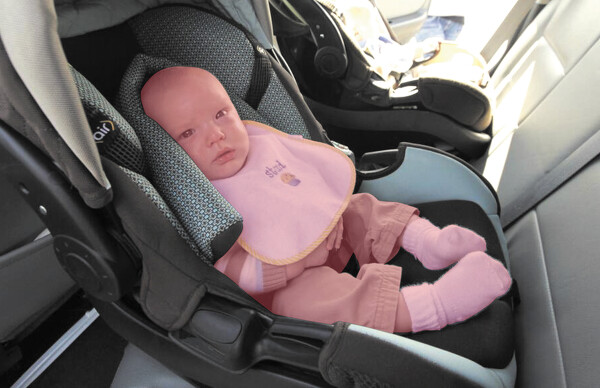Saturday, June 1st, 2024
DANGER: HEATSTROKE
Every summer babies die unattended in hot cars
By Erin Gardner

Photo by Daily Standard Staff
Even with the windows cracked the temperature inside a car can reach 125 degrees in minutes.
CELINA - As temperatures quickly rise, so too do concerns about children and pets being left alone in locked cars, putting them at risk for heat exhaustion and even death.
Roughly 40 children die each year from heatstroke, either because they were left or became trapped in a car, according to the National Highway Traffic Safety Administration (NHTSA).
Ohio doesn't have laws that specifically forbid leaving unattended persons or animals in vehicles, according to Mercer County Sheriff's Office Captain Megan Baker.
However, there is a good samaritan law on the books which makes it legal for an individual, acting in good faith, to break into a vehicle to rescue a person or pet in harm's way,
"There really isn't a specific rule in the state of Ohio that has specific verbiage of leaving a child in a vehicle unattended, whether it's through extreme heat or intense cold," Baker said. "There's not a law that specifies (an exact temperature)."
Every situation is different and depending on the outcome, authorities could pursue child endangering, child neglect or negligent homicide charges.
"If there's a situation such as that, we likely seek legal advice or review from the prosecutor's office before pursuing something of that nature," she said.
In 2021, an Auglaize County grand jury declined to indict anyone in the death of a 1-year-old St. Marys child who was left inside a hot car.
The child was reportedly found in a car and later declared dead. After an autopsy, the Lucas County Coroner's Office deemed the child's death accidental and that the cause was hyperthermia.
Celina Fire Chief Joel Lange said he wasn't aware of any such cases in Celina in recent years.
Child hot car deaths and injuries are largely misunderstood by the general public, according to Kids and Car Safety, a national nonprofit organization. In more than half of hot car deaths, the person responsible unknowingly left a child in a vehicle.
A vehicle can heat up quickly. Even with the windows cracked, the temperature inside a car can reach 125 degrees in minutes, according to Kids and Car Safety. Additionally, cracking the windows does not help slow the heating process or decrease the maximum temperature.
"Children have died from heatstroke in cars when outside temperatures were as low as 60 degrees," the website states.
On top of a vehicle getting hotter quicker, a child's body overheats three to five times faster than an adult's body, per NHTSA. Heatstroke begins when the core body temperature reaches about 104 degrees; a child can die when body temperature reaches 107 degrees.
"The recommendation is to never leave a child unattended, not even for a minute, because you just don't know what they're capable of," Baker said.
"I think obviously common sense goes a long way, but you're always putting your child at risk of not only the hypothermia or hyperthermia, but you also have the concern, depending on the age, of if they are able to get out of their seat," Baker said.
Baker said a child could unbuckle themselves, climb into the front seat and put the car into drive. The child could have an issue with the power window and something could stuck in the window, potentially resulting in strangulation.
"Those are all things you wouldn't think of," she said. "You think you're just going to run in and grab a loaf of bread, but it takes a split second for something to happen."
To ensure a parent or caregiver doesn't leave a child unattended, Kids and Care Safety recommends placing a diaper bag or other item in the front passenger seat as a visual cue of the child's presence. Additionally, make it a habit of opening the back door after parking.
Baker said most newer cars have an auditory and visual cue reminding the driver to check the back seat.
To ensure a child can't access a vehicle, parents and caregivers should keep vehicles locked at all times and never leave car keys within reach of children. As an extra measure, use childproofing knob covers and door alarms to prevent children from exiting the home unnoticed.
NHTSA lists the following hot car death facts:
• About one child every 10 days is killed in a hot car.
• The majority of hot car deaths - 53% - happen because someone forgets a child in a car.
• On average, the first vehicular heatstroke of the year happens in March.
• About 46% of the time when a child was forgotten, the caregiver meant to drop the child off at a daycare or preschool.
• Thursdays and Fridays - the end of the workweek - have had the highest deaths.
• More than half of the deaths -54%- are children under 2 years old.




